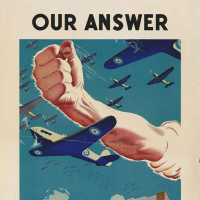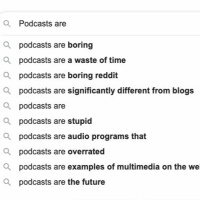Synopsis
Podcast by Aleph Insights
Episodes
-
Propaganda
27/07/2022 Duration: 44minWhen we think of propaganda these days it’s hard not to conjure up images and posters from the Second World War, but was it always this way? This week we discuss propaganda. Does propaganda work anymore or have we, as a society, become immune to propaganda? We explain the concept of “rewired propaganda”, internet memes, clickbait and the differences between misinformation and disinformation. We debate the hypothesis that propaganda is more about style rather than substance and finally, share some of our all-time favourite pieces of propaganda. A few things we mentioned in this podcast: - The Influenza of Evil https://slatestarcodex.com/2015/01/13/evil-is-anti-inductive/ - Overview of 21st Century Propaganda https://en.wikipedia.org/wiki/Overview_of_21st-century_propaganda - Propaganda as Signalling https://www.almendron.com/tribuna/wp-content/uploads/2020/03/propaganda-as-signaling.pdf - The Psychology of Fake News https://www.sciencedirect.com/science/article/pii/S1364661321000516 - ‘The Lambeth Walk’
-
Predicting Russia
20/07/2022 Duration: 39minDoes being a subject matter expert make you good at predicting events? This week, we delve into economist Tyler Cowen's blog on International Relations scholars and their views on Russia and Ukraine, and discuss international relations, analysis, and forecasting. We consider what makes for good analysis and the importance of having a sound methodology, diversity of thought, and understanding our own biases. A few things we mentioned in this podcast: - Tyler Cowen: How did the IR community get Russia/Ukraine so wrong? https://marginalrevolution.com/marginalrevolution/2022/05/how-did-the-ir-community-get-russia-ukraine-so-wrong.html - Conversations with Tyler https://conversationswithtyler.com/ - The Good Judgement Project https://goodjudgment.com/ - Expert Political Judgment: How Good Is It? How Can We Know? By Philip E Tetlock https://www.amazon.co.uk/Expert-Political-Judgment-Good-Know/dp/0691128715 - No True Scotman fallacy https://en.wikipedia.org/wiki/No_true_Scotsman - Cognitive Engineering: Hindsigh
-
Train Timetables
13/07/2022 Duration: 41minDo you ever arrive at a train station early only to gaze up at the timetable in utter confusion as you search for your train? As you stand there bewildered, do you ever wonder if there is a better way to present this kind of information? In this week’s episode, we discuss the exciting topic of train timetables. Why are there different train scheduling systems in different places and can technology help to cut through the complexity? We discuss London postcodes, the perils of standardisation and Shannon entropy. We also reveal the most complicated line on the London Underground network and offer a suite of our own solutions for optimising train travel. Sit back and enjoy the journey. For more information on Aleph Insights visit our website https://alephinsights.com or to get in touch about our podcast email podcast@alephinsights.com Image by Diamond Geezer via Flickr
-
YouTube
06/07/2022 Duration: 40minWhy is YouTube full of documentaries and Netflix packed with drama? Which comes first, the medium or the content? In this week’s podcast, we traverse the history of media consumption, examine YouTube consumer behaviour and explore the differences between traditional programming and the production of YouTube videos. We debate whether we are living in a golden age of series drama and speculate on where you might find the next media growth area. We end by sharing our concept ideas for YouTube channels of the future. A few things we mentioned in this podcast: - State of the YouTube Address – an overview of YouTube usage and growth https://pex.com/blog/state-of-the-youtube-address/ - List of Most-Subscribed YouTube Channels https://en.wikipedia.org/wiki/List_of_most-subscribed_YouTube_channels - How Much Does Animated Video Cost? https://www.wyzowl.com/how-much-does-animated-video-cost/ For more information on Aleph Insights visit our website https://alephinsights.com or to get in touch about our podcast em
-
Predictive Text
29/06/2022 Duration: 36minAutocorrect, spell check and 'smart compose' were ostensibly invented to make our writing lives easier. But are they taking over and making us redundant? In this week’s podcast, we discuss predictive text. Now that there are a slew of freely available AI text-based software applications, should we be disturbed by AI innovations that closely resemble human writing skills? Do they lead to the grave implications claimed by some or should they be seen as benign creations? We discuss GPT-3, AI Dungeon and the implications for children, communications professionals and authors. Finally, we play out a predictive text scenario live in the studio. A few things we mentioned in this podcast: - GPT-3, Bloviator: OpenAI’s language generator has no idea what it’s talking about https://www.technologyreview.com/2020/08/22/1007539/gpt3-openai-language-generator-artificial-intelligence-ai-opinion/ - A Complete Overview of GPT-3 — The Largest Neural Network Ever Created https://towardsdatascience.com/gpt-3-a-complete-overvi
-
Time Travellers
22/06/2022 Duration: 32minIf you were able to time travel back into the past, how would you go about proving you were from the future? Is there a set of predictions you could offer that would improve your chances of being believed? In this week’s podcast, we discuss what it is that makes a person from the future different to those from the present day and what technology or innovation we might replicate to persuade the disbelieving. We also look at the illusion of explanatory depth, the concept of proof, rationality and the Flashman Papers Series. Finally, we disclose our desired guest list for a dinner party made up of historical attendees. - Javier, alleged time-travelling TikToker https://www.tiktok.com/@unicosobreviviente?is_copy_url=1&is_from_webapp=v1 - I, Pencil by Leonard Read https://mises.org/library/i-pencil - Why it took so long to invent the wheel https://www.scientificamerican.com/article/why-it-took-so-long-to-inv/#:~:text=According%20to%20Anthony%2C%20%22It%20was,only%20once%2C%20in%20one%20place - The Science of
-
Multifunctionality
15/06/2022 Duration: 33minAre general tools more useful than specific tools? Is it better to have one thing that tries to do everything or many things that only attempt a single function? In a world awash with multifunctional tools and devices, in this week’s podcast, we discuss multifunctionality. How should we design tools to perform multiple tasks and does multifunctionality lie in the object or in the user? We discuss cobblers cutting keys, stores that sell both darts and televisions, and Swiss army knives. Finally, we share some of our favourite tools and implements. A few things we mentioned in this podcast: - Borlands Darts and Television https://www.google.co.uk/maps/@55.9616074,-3.1802346,3a,38.1y,295.43h,83.33t/data=!3m6!1e1!3m4!1s6Mwzr9NNwZJSKvTlyLtNrA!2e0!7i16384!8i8192 -The Craziest Multi-Tool Ever Made Kills in 100 Different Ways https://www.wired.com/2013/10/you-can-kill-a-man-100-ways-with-this-crazy-swiss-army-knife/ - 25 Multi-functional Products https://goodordering.com/blogs/blog/25-multi-functional-products -
-
The Underdog
01/06/2022 Duration: 36minWhenever a new conflict emerges, the two sides seem to almost naturally fall into an underdog scenario. It’s a concept that looms large in our collective imagination, but is there any evidence the underdog does any better than the top dog? In this week's podcast, we discuss the underdog. What are the benefits of being an underdog and why is the concept more prevalent in sport and warfare than other domains? We survey how the underdog effect operates in historical military campaigns, the Russian invasion of Ukraine and share our favourite underdog stories and examples. A few things we mentioned in this podcast: - ‘Small Axe’ by Bob Marley and Lee ‘Scratch’ Perry https://www.youtube.com/watch?v=r2fjqcThFoM - Wallets, Ballots, or Bullets: Does wealth, democracy, or military capabilities determine war outcomes? https://academic.oup.com/isq/article/57/2/303/1789068?login=true - Military victories against the odds https://en.wikipedia.org/wiki/Military_victories_against_the_odds - Small Firm Effect https://ww
-
Scheduling
25/05/2022 Duration: 33minIf there’s one thing that was made easier by the Covid-19 lockdowns, it was holding meetings online. Now that lockdowns are hopefully a thing of the past, are we once again condemned to the horrors of trying to arrange physical meetings? This week, we discuss the problems with booking meetings. How do you schedule meetings with people coming from different places and is there a way to do it properly? We discuss the set cover problem, information theory and ask if organising meetings solidifies power structures in organisations and groups. We debate whether we should do away with meetings completely or find a way to universally enforce shareable calendars. Finally, Nick and Fraser illustrate a real-life example of scheduling madness. A few things we mentioned in this podcast: - Co-ordination, timing, and common knowledge https://economics.mit.edu/files/17316 - Set cover problem https://en.wikipedia.org/wiki/Set_cover_problem For more information on Aleph Insights visit our website https://alephinsights.co
-
Acceptable Violence?
18/05/2022 Duration: 37minThe old adage that ‘violence is never the answer’ was put to the test when the actor Will Smith slapped comedian Chris Rock at this year's Oscars ceremony. Are there instances where violence is acceptable? And if so, how much violence is proportional? In this week’s podcast, we unpack the infamous Oscars slap and apply an analytical lens to the concept of violence more broadly. We discuss the narrow legal conditions that apply to violence, the historical use of violence in Hollywood films and the presence of violence in early human history. During our discussion we also present the continuum of force, the execution paradox and a game theory approach to the use of violence, as well as the surprising correlation between lead and the decline of violent behaviour in society. - Will Smith slaps Chris Rock on stage at the Oscars https://www.youtube.com/watch?v=myjEoDypUD8 - Reasonable Force Law and Legal Definition https://definitions.uslegal.com/r/reasonable-force/ - Lead–crime hypothesis https://en.wikipedia.or
-
Google-proofing Quizzes
11/05/2022 Duration: 40minAre quizzes and puzzles dying in the era of the internet - where any answer is seemingly a click away - or can they be Google-proofed? This week, we ask our in-house crossword expert to tell us what types of questions create answers that are hard to search for, how a puzzle question should be structured, and what features make for a good puzzle. We also discuss what makes something un-Googleable and consider the implications for human knowledge sharing. If listening to this podcast doesn’t make want to go to your next local pub quiz night, nothing will. A few things we mentioned in this podcast: - Quizmaster devises Google-proof questions to stop pub quiz smartphone cheats https://www.manchestereveningnews.co.uk/news/greater-manchester-news/quizmaster-devises-google-proof-questions-to-stop-878011 - Google-ability and Google ability http://ken-jennings.com/blog/archives/46 - ‘How Google Works’, according to Google developers (note: this doesn’t tell you how Google works) https://developers.google.com/sear
-
Brand Loyalty
04/05/2022 Duration: 39minBrands often build loyal bands of acolytes who can verge on the fanatical. It's easy to find evidence of people professing their love for Apple, Google or HP Sauce, but untangling the reasons why they fall in love with particular brands is more difficult. The idea for this week's podcast comes from loyal listener, Helge. Based on his suggestion, we delve into what kind of brands inspire loyalty, what it means to be loyal to a brand and why people emotionally attach themselves to brands in the first place. We discuss the marketing concept of “value alignment”, cognitive biases associated with brand loyalty and, finally, we share the brands to which we remain steadfastly loyal. For more information on Aleph Insights visit our website https://alephinsights.com or to get in touch about our podcast email podcast@alephinsights.com Image: Captcreate via Flicker
-
Writers Vs Readers
27/04/2022 Duration: 41minYou won't believe the 10 ways that listening to this podcast could change your life!!! This week we discuss writing and whether it is the author's responsibility to engage their audience or the reader's responsibility to buckle down and concentrate. We look at whether the quality of writing affects the quality of the argument and if it is the case that some subject matter cannot be reduced to simple language. We discuss the idea of irreducible complexity and Flesch–Kincaid readability tests. Peter presents his ‘naive information theory’ and Nick proposes an economic model based on the market of ideas. Finally, we share some of our most loved pieces of text that we still regard as terrible writing. A few things we mentioned in this podcast: - Feld et al., ‘Writing Matters’ https://janfeld.weebly.com/uploads/1/1/8/9/118933153/writing_matters.pdf - Flesch-Kincaid readability tests https://en.wikipedia.org/wiki/Flesch%E2%80%93Kincaid_readability_tests - Are Reading and Writing Building on the Same Skills? ht
-
Good Question
20/04/2022 Duration: 40minWhat constitutes a good question? In this week’s podcast, we examine one of the gripping questions of our time: are there more doors or wheels on planet Earth? We use the wheels vs doors debate as a gateway into the dynamics of questions and information exchange, considering how a question should be defined and whether it is the same as generating a hypothesis. In doing so, we discuss logical positivism, value of information theory, Fermi analysis and the Zen Buddhist concept of Mu. Finally, we share the best and worst questions we’ve asked or been asked. A few things we mentioned in this podcast: - More wheels or doors? https://twitter.com/newyorknixon/status/1500000428985286657 - Vienna Circle https://plato.stanford.edu/entries/vienna-circle/ - Fermi Estimate https://brilliant.org/wiki/fermi-estimate/ - Manhattan Project https://www.britannica.com/event/Manhattan-Project For more information on Aleph Insights visit our website https://alephinsights.com or to get in touch about our podcast email podcas
-
School Reunions
13/04/2022 Duration: 37minDo you ever wonder what happened to that kid at school? Are there classmates with whom you've lost touch, but would love to catch up with? Or does the whole thing fill you with dread? In this week’s podcast, we discuss school reunions. We start by probing the reasons behind the popularity of the school reunion film trope of the 1970s and 80s, ask whether school reunions are more than just a benchmarking exercise with our peers, and question the impact of social media on getting together with our schoolmates. Finally, we attempt to guess what our fellow podcast participants were like during their school days. A few things we mentioned in this podcast: - The Impossibility of The Big Chill Today https://www.splicetoday.com/moving-pictures/the-impossibility-of-the-big-chill-today - Google Books Ngram for ‘School Reunion’ https://books.google.com/ngrams/graph?content=school+reunion&year_start=1800&year_end=2019&corpus=26&smoothing=3&direct_url=t1%3B%2Cschool%20reunion%3B%2Cc0#t1%3B%2Cschool%20reunion%3B%2Cc0
-
Startup or Scam?
06/04/2022 Duration: 30minIf you applied for a job at a company that claimed it was merely years away from sending a robot to Mars would you be suspicious? What if the company was run by Elon Musk? In this week’s podcast, we discuss the difference between startups and scams. Do all companies need to pretend to be bigger than they are to generate early revenue and success? We outline the legal conditions required to commit fraud, the infamous Theranos case and set out some red flags for determining if a company meets the scam test. Finally, we share some examples of where we may have stretched the truth ourselves. A few things we mentioned in this podcast: - Jobfished: the con that tricked dozens into working for a fake design agency https://www.bbc.com/news/uk-60387324 - Theranos https://en.wikipedia.org/wiki/Theranos - 12% of corporate leaders are psychopaths https://fortune.com/2021/06/06/corporate-psychopaths-business-leadership-csr/#:~:text=My%20colleagues%20and%20I%20found,of%20psychopathy%20shows%20obvious%20signs For more
-
Disney
30/03/2022 Duration: 36minWe all know the recipe for a classic Disney film: animation, soppy morals, uplifting songs and inspiring plots. But what makes something quintessential or classic? Does defining the features of a brand tell you something about its identity? In this week’s podcast, we discuss Disney films. We ask what cinematic elements make for a classic Disney film? We discuss the Disney renaissance of the late 80s and early 90s, the Sporcle quiz and brand coherence vs brand consistency. Finally, we share our favourite non-Disney Disney films. A few things we mentioned in this podcast: - Encanto trailer https://www.youtube.com/watch?v=CaimKeDcudo - ‘Brand Coherence’ https://drivecreativeagency.com/brand-coherence-care/#:~:text=In%20a%20nutshell%2C%20brand%20coherence,interactions%2C%20to%20name%20a%20few - Samsung’s autonomous sentry gun https://en.wikipedia.org/wiki/SGR-A1 - Volkswagen currywurst https://en.wikipedia.org/wiki/Volkswagen_currywurst For more information on Aleph Insights visit our website https://alep
-
Borders
23/03/2022 Duration: 32minAre borders real or imaginary? Do borders require a territory or area of land, or are there domains without physical space that still contain borders? In this week’s podcast, and in light of recent events, we discuss the complexity of borders and jurisdictions. We explore territorialism in the animal kingdom, the history and economics of borders, and how borders can shape national identity. Finally, we share some of our favourite borders. A few things we mentioned in this podcast: - Chimp war https://www.theguardian.com/science/2010/jun/21/chimpanzees-territory-killing-neighbours - The chitmahals of West Bengal https://en.wikipedia.org/wiki/India%E2%80%93Bangladesh_enclaves - What exactly is the point of the border?https://theconversation.com/what-exactly-is-the-point-of-the-border-99990 - India–Bangladesh enclaves https://thecorrespondent.com/147/borders-dont-just-keep-people-out-they-define-their-worth/19459705650-bbf0f324 - List of territorial disputes https://en.wikipedia.org/wiki/List_of_territorial_
-
What's in a Word?
16/03/2022 Duration: 45minDo you know what servo or katana means? How about doula or damask? A recent study into word recognition among English speakers has found that how recognisable a word is to you may depend on contextual factors, such as nationality or gender. In this week's podcast, we discuss words and language. Is there a difference between understanding a word and understanding how it is used? Does our recognition of certain words tell us something about where we fit into society? We discuss the Shy Tory effect, Urban Dictionary, and debate the differences between American and British English. Finally, we share a few words of our own to see how recognisable they are (or not). - Word prevalence norms for 62,000 English lemmas https://link.springer.com/article/10.3758/s13428-018-1077-9#Tab1 - Words known better by males than by females and vice versa https://link.springer.com/article/10.3758/s13428-018-1077-9/tables/2 - Words known much better in the US than in the UK and vice versa https://link.springer.com/article/10.3758/
-
Adventure
09/03/2022 Duration: 36minDoes an adventure require facing danger and seeing the world, or can you simply go on an adventure around your living room? In this week’s podcast we discuss adventure. What exactly is an adventure and how do you do it properly? We attempt to unravel what makes an adventure interesting, why we undertake them in the first place and what their essential elements are. We analyse the structure of adventure stories, debate Shannon entropy theory and share some of our own favourite adventures and most loved stories. A few things we mentioned in this podcast: - The Hero’s Journey https://en.wikipedia.org/wiki/Hero%27s_journey - The return trip effect https://www.vox.com/2015/6/10/8756765/return-trip-effect For more information on Aleph Insights visit our website https://alephinsights.com or to get in touch about our podcast email podcast@alephinsights.com Image: Thriol via Flickr

































